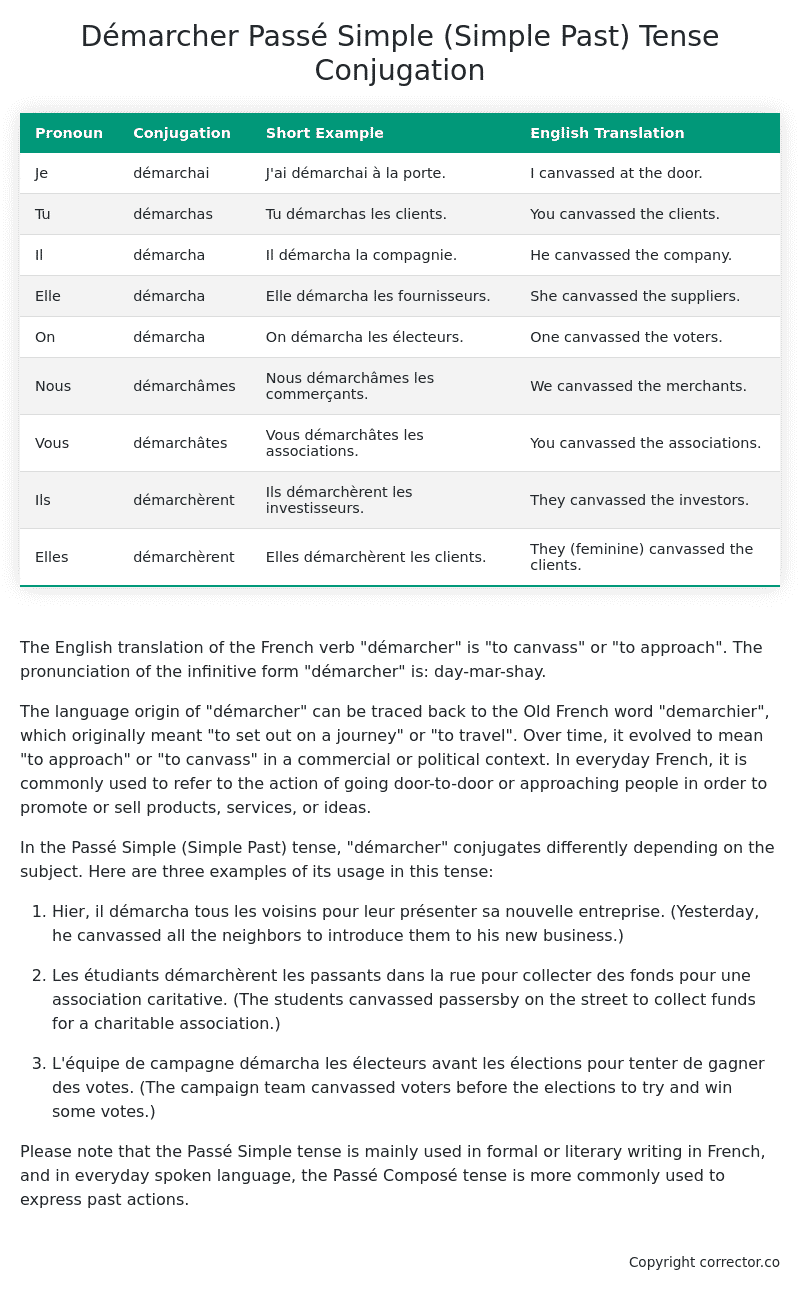Passé Simple (Simple Past) Tense Conjugation of the French Verb démarcher
Introduction to the verb démarcher
The English translation of the French verb “démarcher” is “to canvass” or “to approach”. The pronunciation of the infinitive form “démarcher” is: day-mar-shay.
The language origin of “démarcher” can be traced back to the Old French word “demarchier”, which originally meant “to set out on a journey” or “to travel”. Over time, it evolved to mean “to approach” or “to canvass” in a commercial or political context. In everyday French, it is commonly used to refer to the action of going door-to-door or approaching people in order to promote or sell products, services, or ideas.
In the Passé Simple (Simple Past) tense, “démarcher” conjugates differently depending on the subject. Here are three examples of its usage in this tense:
-
Hier, il démarcha tous les voisins pour leur présenter sa nouvelle entreprise.
(Yesterday, he canvassed all the neighbors to introduce them to his new business.) -
Les étudiants démarchèrent les passants dans la rue pour collecter des fonds pour une association caritative.
(The students canvassed passersby on the street to collect funds for a charitable association.) -
L’équipe de campagne démarcha les électeurs avant les élections pour tenter de gagner des votes.
(The campaign team canvassed voters before the elections to try and win some votes.)
Please note that the Passé Simple tense is mainly used in formal or literary writing in French, and in everyday spoken language, the Passé Composé tense is more commonly used to express past actions.
Table of the Passé Simple (Simple Past) Tense Conjugation of démarcher
| Pronoun | Conjugation | Short Example | English Translation |
|---|---|---|---|
| Je | démarchai | J’ai démarchai à la porte. | I canvassed at the door. |
| Tu | démarchas | Tu démarchas les clients. | You canvassed the clients. |
| Il | démarcha | Il démarcha la compagnie. | He canvassed the company. |
| Elle | démarcha | Elle démarcha les fournisseurs. | She canvassed the suppliers. |
| On | démarcha | On démarcha les électeurs. | One canvassed the voters. |
| Nous | démarchâmes | Nous démarchâmes les commerçants. | We canvassed the merchants. |
| Vous | démarchâtes | Vous démarchâtes les associations. | You canvassed the associations. |
| Ils | démarchèrent | Ils démarchèrent les investisseurs. | They canvassed the investors. |
| Elles | démarchèrent | Elles démarchèrent les clients. | They (feminine) canvassed the clients. |
Other Conjugations for Démarcher.
Le Present (Present Tense) Conjugation of the French Verb démarcher
Imparfait (Imperfect) Tense Conjugation of the French Verb démarcher
Passé Simple (Simple Past) Tense Conjugation of the French Verb démarcher (You’re reading it right now!)
Passé Composé (Present Perfect) Tense Conjugation of the French Verb démarcher
Futur Simple (Simple Future) Tense Conjugation of the French Verb démarcher
Futur Proche (Near Future) Tense Conjugation of the French Verb démarcher
Plus-que-parfait (Pluperfect) Tense Conjugation of the French Verb démarcher
Passé Antérieur (Past Anterior) Tense Conjugation of the French Verb démarcher
Futur Antérieur (Future Anterior) Tense Conjugation of the French Verb démarcher
Subjonctif Présent (Subjunctive Present) Tense Conjugation of the French Verb démarcher
Subjonctif Passé (Subjunctive Past) Tense Conjugation of the French Verb démarcher
Subjonctif Imparfait (Subjunctive Imperfect) Tense Conjugation of the French Verb démarcher
Subjonctif Plus-que-parfait (Subjunctive Pluperfect) Tense Conjugation of the French Verb démarcher
Conditionnel Présent (Conditional Present) Tense Conjugation of the French Verb démarcher
Conditionnel Passé (Conditional Past) Tense Conjugation of the French Verb démarcher
Conditionnel Passé II (Conditional Past II) Tense Conjugation of the French Verb démarcher
L’impératif Présent (Imperative Present) Tense Conjugation of the French Verb démarcher
L’impératif Passé (Imperative Past) Tense Conjugation of the French Verb démarcher
L’infinitif Présent (Infinitive Present) Tense Conjugation of the French Verb démarcher
L’infinitif Passé (Infinitive Past) Tense Conjugation of the French Verb démarcher
Le Participe Présent (Present Participle) Tense Conjugation of the French Verb démarcher
Le Participe Passé (Past Participle) Tense Conjugation of the French Verb démarcher
Struggling with French verbs or the language in general? Why not use our free French Grammar Checker – no registration required!
Get a FREE Download Study Sheet of this Conjugation 🔥
Simply right click the image below, click “save image” and get your free reference for the démarcher Passé Simple tense conjugation!

Démarcher – About the French Passé Simple (Simple Past) Tense
Formation
Usage
Narration
Historical Context
Interactions with other tenses
Passé Composé
Imparfait
Conditional and Subjunctive
Summary
I hope you enjoyed this article on the verb démarcher. Still in a learning mood? Check out another TOTALLY random French verb conjugation!


